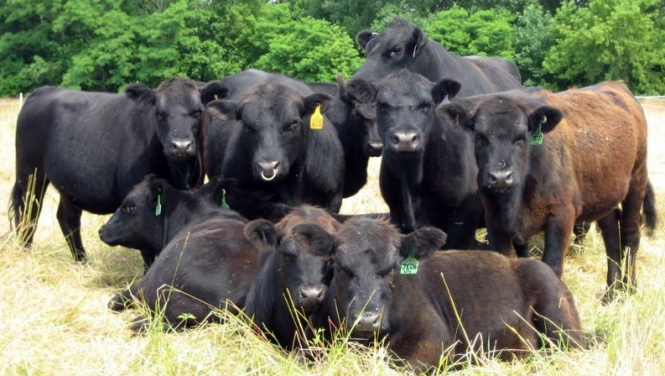This is part three in our series of posts about small farmers and artisans in southwest Michigan. Earlier this week, we featured stories about a new retail business selling artisanal meats, and about a couple growing Chardonnay grapes. Today we profile the owners of another small farm. Tomorrow we will close with some observations about the future of small-scale agriculture in Michigan.
A Visit to Middlebrook Farm
Bob and Janet Schuttler didn’t set out to raise and sell grass-fed beef. Bob chalks it up to “dumb luck.” They had run out of projects at their vacation home near Lake Michigan and started driving by rural properties—including the 22-acres of land and 1844 farmhouse that comprise Middlebrook Farm. They bought the place in 2005, and two years later, Bob left his family-owned, Chicago-area construction business.
They soon realized the land was tired from the corn and soybean rotation. To bring back the soil they planted a beautiful field of winter wheat as a cover crop. The next year they planted a grass mixture to further improve soil nutrients. Janet says when they read Michael Pollan’s The Omnivore’s Dilemma, it made them think about raising beef on the pasture they had started. Further research showed that Lowline Angus were “good grass converters.”
They bought their first heifer in January 2008. “Our intention was to have a very valuable herd of high end, high value animals to sell as breeders,” Bob explains. “We thought Lowline Angus would be valuable to other boutique breeders and commercial farmers who wanted to downsize the physical size of their animals to get more on a given piece of land. And we wanted to provide a smaller bull for farmers wishing to do breeding the old-fashioned way.” Cross breeding brings out “hybrid-vigor,” or the best of both breeds, excellent for beef production. This meant that while building their breeding-stock herd, the couple could take advantage of the growing demand for premium grass-fed beef. In 2009 they began retail sales within a 100-mile radius.
Janet is reflective about their relationship to small farming. “There’s no exit strategy. We’re so involved and planted to this little piece of earth that I can see both of us dying here. There is no way it can be more intimate—our caring for the animals is almost like caring for our children.” Bob puts it in perspective, “The animals are totally dependent on us and we’re totally dependent on them for our future livelihood—hopefully.” The business is a source of revenue, but is a lifestyle first, according to Bob. They have no plans to retire to the golf course or the beach.
Both Bob and Janet have realized health benefits as a result of the transition to the hard, daily work of a small, non-mechanized farm. Bob describes how Janet jumps over fences to put straw down for the bull. His blood pressure has dropped significantly. Farm life brings appreciation and deep satisfaction. Janet describes a “feeling of contentment and peace that comes from being connected to the land and paying attention to Mother Nature.” “Dumb luck” may have gotten them in the business, but it will take more to get them out. Bob says, “We’re rebels as are most organic farmers in the way we’re going against industrial agriculture. We’re not approaching life like we’re retiring and going into the sunset.”
Middlebrook Farm
Three Oaks, MI
269.756.9778
www.middlebrookfarm.net
Header photograph of Middlebrook's beef by Rob Schuttler.
 Paula Bartholome combines part-time teaching at DePaul University’s School for New Learning and occasional work through her firm Parallax with a full-time love of all things food – growing, eating and promoting – in her Southwest Michigan hometown, New Buffalo. She blogs about living simply, eating well and walking softly on the earth at Garden-Table and occasionally about blooming where you are planted at BajiggityLife. Email her at gardentotableinfo@gmail.com.
Paula Bartholome combines part-time teaching at DePaul University’s School for New Learning and occasional work through her firm Parallax with a full-time love of all things food – growing, eating and promoting – in her Southwest Michigan hometown, New Buffalo. She blogs about living simply, eating well and walking softly on the earth at Garden-Table and occasionally about blooming where you are planted at BajiggityLife. Email her at gardentotableinfo@gmail.com.




